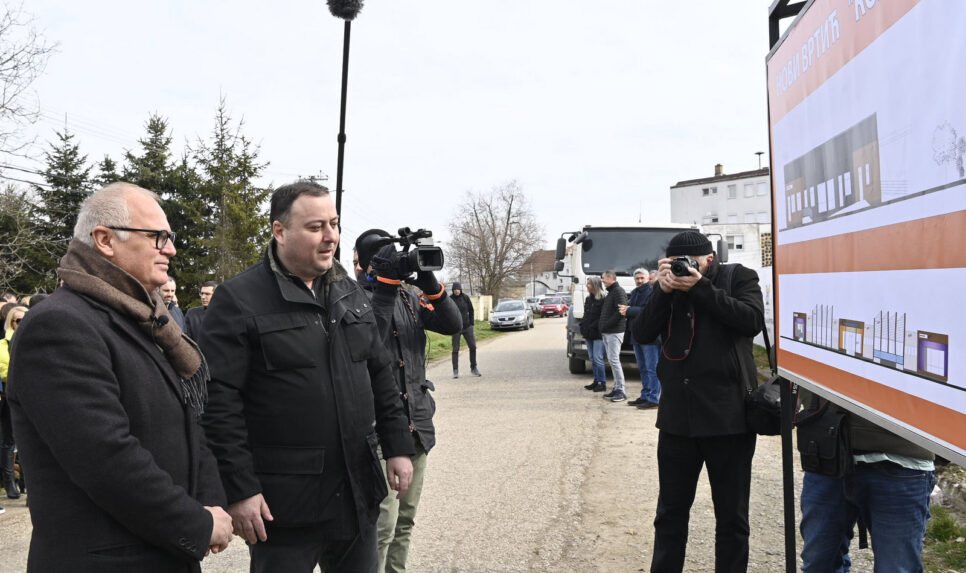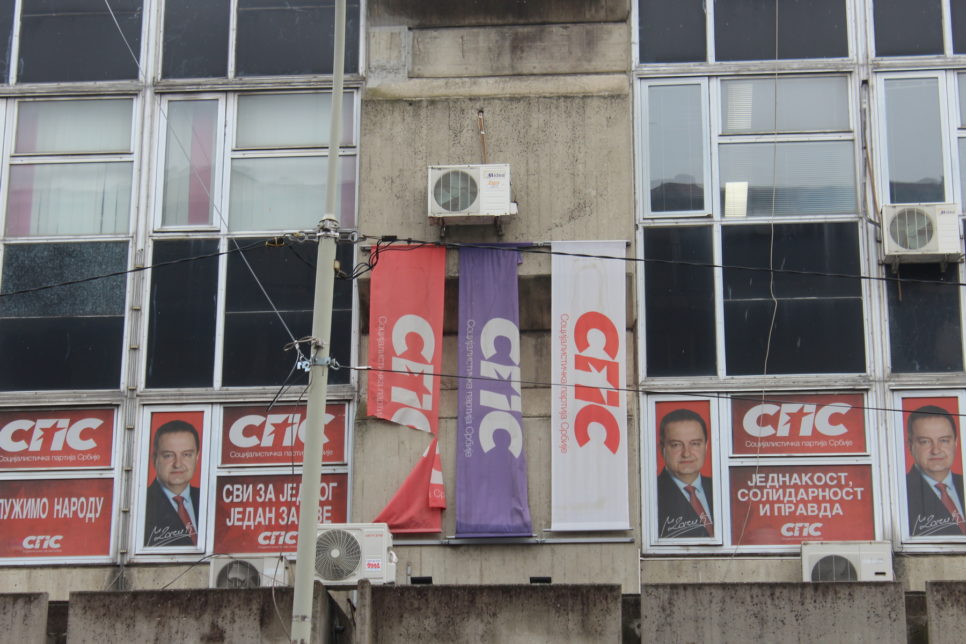In February 2017, the Administration for Joint Services of Republic Bodiespublished a call for security services for 10 state institutions over the period of two years, divided into 26 batches worth almost 890 million dinars.
The institutions which sought security services comprised the Customs Administration, Treasury Administration, Administration for the Prevention of Money Laundering, Development Fundof the Republic of Serbia, and others.
Only one bidder respectively responded to 21 batches, worth between four and 120 million dinars, with acceptable offers. Almost all bidders quoted prices which were slightly lower than the assessed value of the batch for which they were quoting the bid.
No one applied for two batches, while two to four bidders responded to the three remaining batches worth between 4.5 and 5.3 million dinars.
In as many as 14 batches, or all in which they participated, the successful bidders were Belgrade-based companies Dobergard and Dobergard plus owned by Dušan Đukić – by themselves or within a consortium. Besides them, no one else applied for these batches.
Together with four other companies – V.I.P. security, G4S secure solutions, Securitas SE, and Inter Safe Business – they won securing of the Administration for Joint Services, while they won provision of security services for facilities of the Tax Administration and Treasury Administration independently. In the end of November 2018, in line with the framework agreement from the previous year, they signed the total of 11 contracts at the value of 16.8 million dinars.
Based on these contracts, they protect front offices of the Tax Administration inthe Autonomous Province of Vojvodina, that is city of Subotica, Bela Crkva, Zrenjanin, at several places in Novi Sad, and in other towns in Vojvodina from fire and violent entries.
Although the manner in which these operations were assigned is in line with law, there was almost no competition.
Rade Đurić, jurist engaged in public procurement, says for the Center for Investigative Journalism of Serbia (CINS) that the conditions at the competition to which the companies applied were defined so that the bidders would be practically forced to make mutual agreements.
“This is a manner to diminish competition, in view of poor mutual relations in the security sector,” said Đurić, adding that citizens are the ones who bear the greatest damage that way, while the quality of the service is also reduced.
The Instruction for detection of rigged bids in public procurement procedures published at the web-site of the Commission for Protection of Competition states that “market participants frequently respond to public tenders jointly, clandestinely agreeing as to their approach before the submission of the bid, with the aim to increase the price of the service, i.e. decrease the quality of the service, depending on the subject of procurement”.
Such practices, which present the gravest form of violation of competition, are difficult to prove.
Dušan Đukić denies that there were any agreements in relation to this public procurement. “We are a group of bidders who found it in our mutual interest to act as a consortium, which is not prohibited in the Law on public procurements,” said Đukić for CINS.
Mila Sašić, head of the Department for public procurement within the Administration for Joint Services of Republic Bodies said for CINS that the Administration has no impact on who will apply to the bid, but she excludes the possibility of rigged procurements, as the bidders are obliged to provide a document to that effect together with the bid:
“The Statement on the independent bid is an integral part of bidding documents signed by all bidders, thus there is no possibility for bidders to make any arrangements.”
The Public Procurement Office, which formally manages the public procurement system, replied to CINS by explaining legal procedures, among others, that bidders are obliged to file the given statement, under full material and criminal responsibility.
The Commission for Protection of Competition is a state body that investigates whether the legal obligation of enabling competition was violated. The web-page of the Commission contains no data about this procurement.
Joint procurements
The Administration for Joint Services of Republic Bodies launches centralized public procurements for supreme state and judicial bodies. They include the National Parliament, Government and its services, all ministries except for the Ministry of Defense and Ministry of Interior, some courts and prosecutors’ offices of the highest order, but also independent bodies such as the Ombudsman, State Audit Institution, Anti-corruption Agency, and others.
Procurements conducted by the Administration also include security services. Procedures are conducted within open and restrictive proceedings, while the Administration is obliged to define procurements in batches whenever it is possible.
The same happened with the procurement from 2017, which the Administration conducted based on procurement plans of individual bodies which need to inform the Administration about their needs in advance.
Dobergard in competition with itself
In the repeated procedure for securing of the Tax Administration in Belgrade and some facilities of the Treasury Administration, all bids were unacceptable so that the public procurement procedure was suspended in the end of July 2017.
In the negotiation process which ensued, which the Administration for Joint Services had the right to in case of failure of the open procedure, three groups of bidders were invited, with companies Dobergard and Dobergard plus in two of them.
The business of securing of the Treasury Administration, worth somewhat more than 12 million dinars, was assigned to the two companies, while the procedure for securing of the Tax Administration was suspended as the quoted prices were too high.
Finally, in October 2017, a group of bidders led by company Tisten Group won the operation of securing of front offices of the Tax Administration, while the value of the contract amounted to 14.5 million dinars.
This procurement comprises perceptible conditions which may be interpreted as discriminatory, concluded jurist Rade Đurić analyzing the procurement from 2017.
For individual batches, the ordering party, i.e. the Administration states the actual number of persons who need to be employed by the bidder so as to realize the procurement, with a note that one employee may be stated for one batch only.
“Such a request actually deters small bidders from participating, but on the other hand may force them to join forces. However, in a system where there are relatively poor relations among most companies extending this service, it rather has the effect of a deterrent. In reality, this has no sense, the state individuals most probably would not even be employed for the operation, but would be engaged in line with agreement and needs,” said Đurić.
For five batches with the assessed value exceeding 60 million dinars, the Administration requested the bidders to supply a proof that they had provided services toat least one client for the same amount of money, for at least one year continuously.
“This seriously shatters competition, so they most probably had to join forces and share the job, or those who did not meet the requests simply fell out. Quite unnecessarily, as it seems to me that a large majority of companies could achieve it without a problem. Just give them an opportunity and they will conclude contracts with new clients and will have the reference soon,” explained Đurić.
Mila Sašić from the Administration for Joint Services of Republic Bodies denies that this condition is discriminatory, explaining that the Administration “prescribes conditions which correspond to needs of all ordering parties for which the procedure is conducted and in relation to the object of public procurement”.
The object to keep old positions
Nine bidders and groups of bidders, or 13 companies in total responded to the public invitation of the Administration in 2017. One group of two companies quoted an unacceptable bid, while 11 companies won securing the facilities from the public procurement procedure. Thus, Sion gard and TAS security won in the bidding for the Tax Administration – Centre for large taxpayers, unlike companies Semiotik and Semiotik Velimirović, whose bid was unacceptable. The same companies won securing of the Administration for Prevention of Money Laundering, where there were no other bidders, while they won securing of the Commission for Protection of Competition within public procurement by competing with three other companies.
Dobergard’s operations
Company Dobergard was founded in 2004. It is owned by Dušan Đukić, who also owns security company Dobergard Plus, and the company for technical research and analysis KNC Group. In 2017, Dobergard also bought company DSTV Investments which is in the area of consulting.
Company Dobergard also features a kennel for dogs of Doberman breed located in Ritopek, a suburban settlement of Belgrade. The company started growing financially in 2012, while it got into the significant business with state institutions in 2013.
According to data from financial reports for 2017, it had 477 full-time employees, as well as 340 temporary and part-time employees.
In the previous year, Dobergard earned somewhat more than one billion dinars from security services.
Stevan Brusin, director of TAS security said that before talking to the CINS journalist neither he nor the company owner was aware that they had participated in this procurement, while the previous directordid not leave any documents in relation to this. Having examined the documents, he said that another bidder in the group – Sion gard – “essentially bided autonomously”, while TAS security was needed because of the license it had had, which was a condition to participate in the tender.
“TAS security had no benefit whatsoever from this public procurement and the joint offer with Sion gard”, added Brusin.
Inter safe business was a member of the group of bidders, together with companies Dobergard and Dobergard plus, V.I.P. security, G4S secure solutions, and Securitas SE, which was the only bidder for five batches of security services for the Administration for Joint Services of Republic Bodies. They were successful in all five of them. The same company also participated within the group of bidders of Protecta group, Zaštita sigurnost, and Revnost, for security services for the Customs Administration. Zaštita sigurnost was the only participant – and the winner – in the part of the procurement prescribed for securing of the Tax Administration in Kragujevac.
“We had to affiliate for the Customs Administration because we do not have sufficient people to cover it fully, from Dimitrovgrad to Subotica, and this is where some kind of affiliation is sought – someone who has employees in certain locations,” was stated in the reply of Zaštita sigurnost to CINS, explaining that cooperation with other companies was reduced to definition of a joint offer.
They add that they applied for facilities they had been guarding even before the procedure was incorporated among competences of the Administration: “We have been securing the Seismological Survey of Serbia for about ten years, Tax Administration for more than six years, Customs Administration likewise; going for places occupied by other companies’ employees is difficult, because the employer will pull his people after him.”
Securitas services acted in the bidding as a member of a consortium as they did not have the requested number of licensed employees.
Market by the measure of the large
Within the event entitled “Towards the professional private security sector” held in 2017 in organization of the Belgrade Centre for Security Policy (BCBP) it was concluded that the public sector engages about 60% of the private security market in Serbia, and that it is necessary to reinforce controls of framework agreements and insist of use of restrictive agreements, especially if it is about securing of key infrastructural facilities – states the BCBP web-site.
CINS interviewees point to the fact that high standards which the bidders need to meet to be able to bid at private security procurements discourages new companies to apply for such operations.
Rade Đurić points that such conditions will result in following competitions with similar conditions ending in winning of the same bidder, and that, regardless of the fact that the security service market is large, such practices create a gap between the “big ones and small ones.”
“It affects prices, savings, and quality of services. If you know you will win, why should you try to do the job better? Your reference certainly gives you guarantees for the next contract. If there is no competition, or if it is “a loyal one”, the price cannot go down, and it is always on the verge of what is assessed,” adds Đurić.
Goran Ivković from Protecta group points that for small new companies it is difficult to participate at all because they need a lot of initial capital because of the conditions.
“You cannot do it independently before you spread your operations and start working seriously, you cannot apply to some larger public procurements. For start, you need to go for some smaller public procurements,some smaller operations, which are also less paid by default,” said Ivković.
Dušan Đukić, owner of Dobergard and Dobegard plus said for CINS that for this reason – deficiency of employees trained for private security operations – he couldn’t bid for more than 14 batches. For five batches, he filed an offer within a consortium, so as to ensure that his guards would stay within the facilities of the Administration for Joint Services which they had been already securing:
“The only solution was to merge in the consortium, which is permitted by law, so that everyone keeps the facilities they have been securing up to that moment through a joint offer.”
Company G4S applied independently to two batches, and won securing of the Directorate for Inland Waterways, for which it was the only bidder. Protecta group also quoted two bids independently, and won securing of some facilities of the Treasury Administration despite the price which was higher than planned. Namely, the assessed value for this batch amounted to 26.4 million dinars, while Protecta offered to do this job for 33.9 million dinars. However, revoking the Law on public procurements, the Administration for Joint Services accepted the offer as it was “not higher than the comparative market price.”
Goran Ivković, general director of Protecta group, says for CINS conditions at competitions are set so that it is not possible to apply for some operations by oneself, but that they act independently whenever it is possible.
They managed to be granted a higher price, which, according to Ivković is still below the real price, as no one else had applied for this batch.
“Having in mind that this was the only offer, they decided to accept it; they called us and asked us if we could reduce the price, and we explained that the quoted price was subnormal too, but that we want to work. Then they passed the decision to accept the price and rebalance the budget,” explained Ivković.
G4S, Sion gard, Revnost, and VIP security had not replied to the questions before the text was published. Director of company Inter safe business did not want to comment the procurement.
The Administration plans the following procurement related to physical-technical security and fire protection of facilities over the period of two years in January-February 2019.

.png)





What do you think